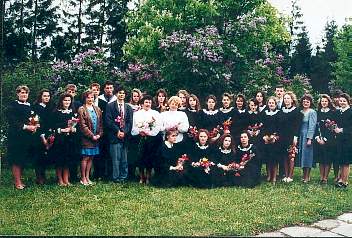 Graduating Classes 12a & 12b with me and other teachers 1994. Click on the image to go to Linkuva School Website!
Graduating Classes 12a & 12b with me and other teachers 1994. Click on the image to go to Linkuva School Website!In Spring 1994, I was looking for a career as I was coming to the end of a 4 year course in History at the Unversity of Glasgow. I didn't have clue what I wanted to do, but came across an advert asking for volunteers to go to Lithuania to teach English. I immediately applied and within 2 weeks, I had signed up, along with 40 other students at Scottish Universities, and was allocated a posting to a village in northern Lithuania called LINKUVA.
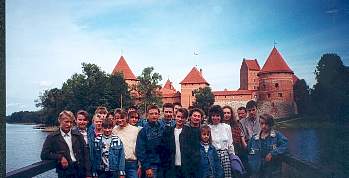 Class 9a at Trakai Castle near Vilnius 1994
Class 9a at Trakai Castle near Vilnius 1994I spent one year there, enjoyed it so much I went back for a second, moving to the nearby town of Pasvalys. I now go back every year and spend 2 weeks with my friend Ewen and his family in Birzai, a town near the Latvian border about 20 miles north of Pasvalys. This part of Lithuania is about 4-5 hours bus journey from the Capital, Vilnius, itself a stunningly beautiful city.
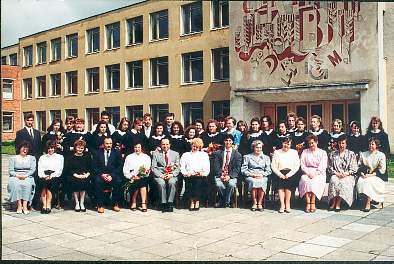 Linkuva School Graduating Class 1995
Linkuva School Graduating Class 1995I was lucky with my posting to Linkuva; although there were virtually no English Speakers in the village except for the kids I was teaching and a couple of English teachers at the School (the Lithuanian for school is MOKYKLA, and a teacher is a MOKYTOJAS, hence the name of the page, Combat Mokytojas-Combat Teacher, it was a standing joke amongst the Scots contingent that we were Combat Teachers, doing a Tour of Duty in the 'Uva, that is Lietuva, the Lithuanian name for Lithuania as oppossed to 'Nam- the Scots went there without any training, or language courses compared to the American Peace Corps who had all kinds of back up!), this meant I had to really get to know Lithuanian very quickly, and met lots of Lithuanians in their own homes, getting a real feel for the Lithuanian way of life. This was an experience that not all the Scots got, some having virtually no social contact with any Lithuanians outside of school either through choice or circumstance.
 Linkuva Church
Linkuva ChurchI spent many week-ends travelling all over Lithuania, both on trips with Lithuanians and to visit some of the other Scots, enjoying those parties that Scots are legendary for. Single-handedly, we kept the Lithuanian Beer Industry alive!
<
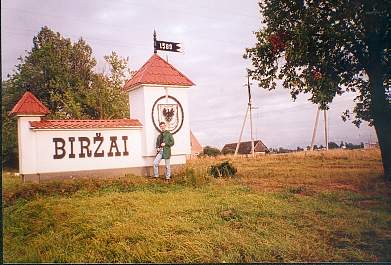 The Outskirts of Birzai
The Outskirts of Birzai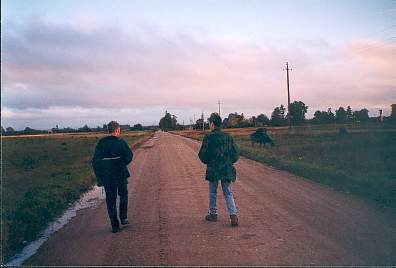 Neil & Ewen on the way to the Cow Hole, near Birzai
Neil & Ewen on the way to the Cow Hole, near BirzaiMY FIRST DAY IN LITHUANIA
When I arrived in Lithuania, I knew only three words of Lithuanian: Yes (taip), No (ne) and beer (alus). I expected to be met at the Airport by the Headmaster of Linkuva School, Algis Dicpetris (who passed away on Christmas Day, 2001). However, to my alarm, no-one was there to meet me. I managed to find someone in the Airport who spoke English, who tried the only phone-number I had for Linkuva for me. Unfortunately, this number was for the School and naturally enough at 9pm, there was no answer. So I checked into a Hotel, using up one-third of the money I had taken with me (the innocent abroad, ripped off for looking lost, Western and wide-eyed!). I virtually cried myself to sleep, especially having turned the hotelroom TV on to see a prime-time show on Country Dancing. It was a severe case of Culture Shock.
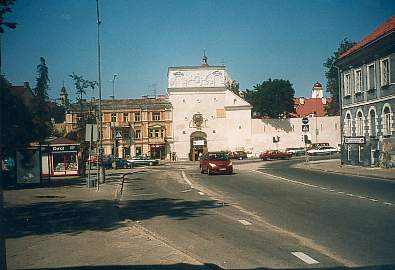 The Gates of Dawn, Vilnius
The Gates of Dawn, VilniusThe next day, I managed to catch a trolleybus to the Bus Station, Mr Dicpetris having kindly sent me a list of bus times a month before. I managed, somehow, to purchase a ticket and sat down to wait the two hours before the bus. It was all a big adventure and the stress of the previous evening's traumas had been forgotten. I was excited when a Lithuanian started speaking to me from behind in English.
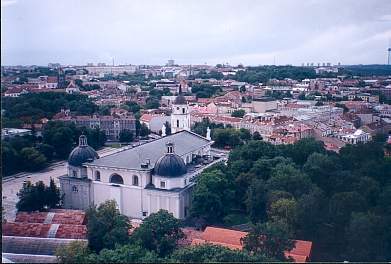 Vilnius From Gedimino Tower
Vilnius From Gedimino TowerAt last, a friendly face to talk to. Witless Fool! He was merely distracting my attention while his pal stole my suitcase! It took me ten minutes to get the message across to a Policeman that I had become a victim of his country's sneak thieves. I was immediately taken for a tour of the seedier bars nearby by two Policemen who started pointing out "the usual suspects" to me. Very unpleasant, the looks I was given suggest that they wanted to do more to me than steal my luggage. As we returned to the Bus Station, I had already given up on the case, I had to sit out a month on borrowed clothes before using my return ticket to get home, defeated by the Post-Communist crime wave, when I caught sight of the man who had kept me talking, inside the bus station! He was arrested and within 20 minutes, my suitcase was back with me. Ruthless, but stupid, these Lithuanian criminals!
 Laisvidas and Rey Sidlauskas
Laisvidas and Rey SidlauskasI thanked the policeman and tried to leave, but was not allowed to; clearly a foreign idiot like me could not be trusted not to interrupt their afternoon again. I had to wait for a very long time whilst I was quizzed in Lithuanian (a small dictionary my father had bought me when on holiday in the States was passed back and forth with each exchange) as to the cost in Scotland of cars, houses and prostitutes. When it came time for my bus, I was escorted by two policemen who, I believe, told the bus driver to take care of this mentally-backward Westerner with a penchant for losing his luggage. There now followed a five hour bus journey, in blazing heat, in a bus which had the pleasantly rustic scent of stale beer and dirty linen. I enjoyed the trip immensely and thought "I'm here, I've done it, what an adventure!". Sure enough every time the bus stopped, the Driver warned me how long we were stopped for. In Panevezys, I remembered that I had had nothing to eat or drink all day and managed to purchase a can of Coke and two bananas. That was the sum total of my ability at that point in time. My next worry was what would I do when I arrived in Linkuva, not knowing how big it was, how easy it would be to find Mr Dicpetris. I fully expected to have to sleep on the steps of the school, if I could find it. Luckily, when we arrived in Linkuva, the bus driver, a Vilnius man, drove me from the bus stop to Dicpetris house, asking directions several times. I arrived at Dicpetris home on the evening of September 1st. I was suppossed to have been at school that morning, as September 1st is one of the High Days of the School Year. "So you have finally come", were his first words to me. I had arrived.
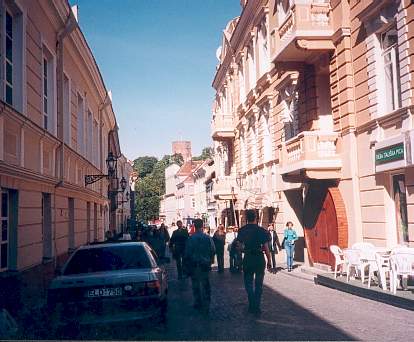
Pilies Gatve(Castle Street) Vilnius, Looking toward Castle Hill and Gedimino Tower
MY FIRST DAY AT SCHOOL
I was staying with Mr & Mrs Dicpetris as the school had not rented a flat for me yet as they had not wanted to do so until they were sure that I was going to come and that I intended to stay. We went into school, which was a Friday and met all the Teachers and some of the classes I would be teaching. At lunchtime, there was a party in the staff room in celebration of the recent wedding of two of the teachers. We had rather a lot of brandy. What a good way to start my new career!
A week later I had the pleasant experience of being chased down a lane by a scythe-wielding man. I was investigating Linkuva to see how big the place was. I turned into a lane to be confronted by a man cutting grass with a scythe and smiling through a mouth in which most of his teeth were replaced with gold. He started running towards me waving the scythe above his head. He was shouting ",my friend, my friend!&qout;, Not on your life, mate, I thought and strode off in the opposite direction. Turns out that this was Rey's dad, Mr Sidlauskas. The Sidlauskas's became like a second family to me, and still when they write, they always sign off with "your second parents", Mr Sidlauskas was allowed to keep his cows in the school yard in return for doing odd jobs around the school, like cutting the grass. They get up at 4am everyday to feed their animals. By 5 they have set up their stall selling second hand clothes in the Market Place where they stay until between 12 & 2pm. The rest of the day is spent on the vegetable garden and their animals. It is a difficult life, needless to say. Rey Sidlauskas and I used to share a flat in Pasvalys. His brother Laisvidas lives in Birzai, where my friend Ewen also lives. Rey now lives in Malmo, Sweden. We had many adventures and I have many stories to tell about Rey and my adventures.
LIUDA AND HER FAMILY
Liuda and Sasha Monkevicius were some of my closest friends in Linkuva. Liuda's mother Anna was a Physics teacher at school, and her father Jonas was a local electrician. Sasha and Liuda were both pupils of mine, and very intelligent kids they were too. We often had a very good time in Linkuva and it was always appreciated that the Monkevicius family were prepared to be friendly and help me out when I needed it. Anna often brought me large hunks of home-made chesse, or jars of sauerkraut and several times I was invited to The Monkevicius house for parties.
In Linkuva, during the spring, autumn and summer, you only got hot water at the weekend and on a Tuesday and Thursday night. It was a legitimate excuse not to go to an invitation because you were washing your hair! When I needed to change the bedclothes, I had to go to the local orphanage to hand over the ones needing washed and get a clean set.
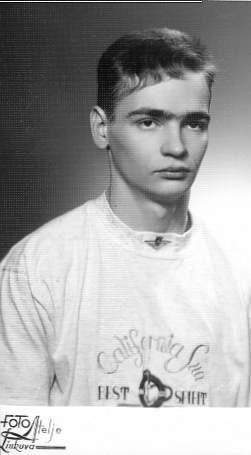
Dainius in 1995
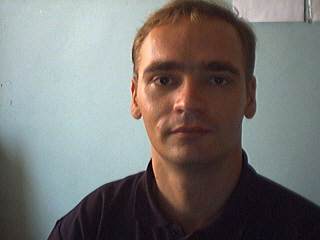
Dainius 2003
Every night, DAINIUS BALBONA came to visit me. Dainius was in the ninth form, that is about 15 and he lived in the flat below mine. He came up to visit every night, mainly to keep me company, I don't know whether the school had asked him to do this, but I really appreciated it. We played cards, chess and he played Lithuanian pop music and discussed world events or whether the Loch Ness monster really existed. Without Dainius I think that I would have gone mad and I really appreciate what he did for me. When I arrived back In Linkuva after Christmas in January 1995, Dainius came to the Bus Stop three times that day to see if I was on the bus from Vilnius. I arrived on the third and final bus of the day at 8:20pm in minus 10 degrees C. Dainius had already waited on the previous two buses in case I was on them, carried my suitcase to the flat and even had his mother bake me a pizza when I arrived. Dainius these days works in Siauliai and I think he is a credit to himself, his family and his nation. I hope he does not mind me saying this.
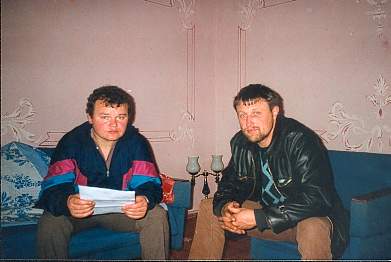
Kestas whose TV I fixed.
THE FIXER
One evening in the middle of winter I was settling down to read a book when there was a knock at the door. It was Dicpetris with another man, obviously a farmer by his mud-caked clothes and his round, red face (very few people in Linkuva are not farmers of some sort, mainly working little allotment-type gardens to provide potatoes and onions for their families). I had washed and was thinking about bed, but Dicpetris told me that this man had bought a new TV and all the instructions were in English and no-one knew how to tune the thing in. I was asked to go to the man's house and tune his telly. I arrived and read the manual. It's difficult enough to sort out a new appliance in the west, but I managed to tune Kestas(for that was his name) TV into not only the standard 3 channels but also 2 Latvian channels.
Having done my work, I thought I would be able to go home, but Dicpetris informed me that the family had asked me to stay while they said thank you for the assistance I had given. Dicpetris left and I stayed. The family went out and bought a bottle of German Licquor. It cost the same as two bottles of vodka. We sat and watched the new TV. I was the guest of honour and I really appreciated it. Only problem was that there were three kids in the family, all under school age. They kept wanting to sit next to me. This was endearing, but they had nasty green patches on their face which I assumed were disease of some kind or another. I kept edgeing away from them and each time I did so, they edged closer towards me. It was comical, I tried to keep away from them and they kept trying to be closer to me! Eventually I managed to convince the men of the house to come back to mine for a beer, evading the apparently disease-ridden kids. Days later, I discovered that green mould on the children's faces was in fact a medecine designed to combat the effects of itchy chicken-pox scars!
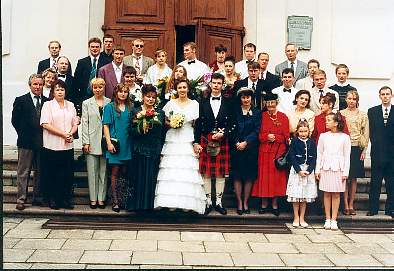 The main Guests at the Wedding of Ewen and Saule 1998
The main Guests at the Wedding of Ewen and Saule 1998During my first few weeks in Linkuva, I was invited, along with Gary, a volunteer like me who was from Morpeth and who was working in the nearby town of Pakruojis, on several school trips. These gave me a very early opportunity to visit some of Lithuania's top Tourist Attractions. We were taken, along with whole classes of kids, in glorious late summer weather to Vilnius, Trakai, Klaipeda, Palanga and the Courland Spit, Siauliai, and Kaunas. Our trip to Vilnius took 5 hours to get there on a bus that kept breaking down. We went straight to the island castle of Trakai, previously a ruined castle, but fully reconstructed in Soviet times. The setting on an island in the middle of a lake is stunning. The trip then hired a taxi-tour of Vilnius for us. We visited the cemetery where the greats of recent Lithuanian history are buried including the 13 who were killed under Soviet tank tracks in 1991, and the eight volunteer Border Guards murdered by the Speznatz (Russian Special Forces) at Medininkai the same year. We also visited Parliament, where the barricades erected when the Russians tried to supress independence in 1991 have been left as a memorial to the dead & as a reminder of the fight for independence. You can still see the bullet holes where the tanks fired over the heads of the crowds. After viewing the Old Town of Vilnius from a hill, Vilnius being without doubt, the most beautiful city I have ever seen, we met back up with the bus at Vilnius TV Tower, the 4th tallest building in Europe, a free standing monolith that dominates the Vilnius Skyline. Outside the Tower is where the 13 protesters in 1991 were crushed under the Russian Tank Treads. There is a moving museum to those events inside, then it was a lift ride to the observation deck where we had ice cream while the deck rotated on a gorgoeus summer's afternoon. We saw the whole of Vilnius Region. Very impressive and well worth the effort to get to. After that it was home, where we all dropped exhausted into bed at around midnight.
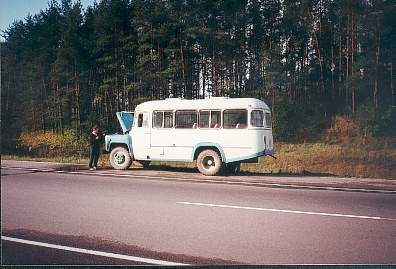 The bus that took us on our school trip to Vilnius.
The bus that took us on our school trip to Vilnius. In mid-September, we had to go to a Welcome Meeting for all the Scottish Teachers at the Ministry of Education in Vilnius. Dicpetris took Gary and I down on the bus, leaving at 5am from Pakruojis. The meeting was largely dull except that it gave us the chance to meet some of the weird and wonderful people I was to spend many week-ends with over the next two years. Some I still keep in touch with! We went with the two Ukmerge boys, James & Neil, for a meal at Ritos restaurant near the river. When we had finished our meal, they assured Gary and I that it was only a fifteen minute walk back to the Bus Station. Half an hour later we arrived to discover we'd missed the last bus to Linkuva by 10 minutes, with Dicpetris on it. Curse those Ukmerge wasters! We waited half an hour in the growing gloom not really knowing what to do. Luckily a man with a half demolished Lada offered us a lift to Panevezys, where he was going and wanted to reduce the petrol costs. We hurtled up the Dual Carriageway at 80 MPH with, no seat belts and what sounded like the Lada's rattling death throes. We survived, nauseous, but had made up half an hour on the Linkuva bus. Imagine Dicpetris' surprise when we got on the bus in Panevezys. All's well that ends well, he beamed.
That night, I was sicker than I ever remember having been before in my life. I did not sleep at all and suffered terrible stomach cramps. Since that day, I have never been back to Ritos Restaurant, even though I am told it is one of the best in Vilnius. What the experience did, though, was give me a stomach of steel, something you need for an extended stay in Lithuania, with it's more stolid foods. I never again suffered from food poisoning, despite eating in some extremely dodgy kavines (cafes).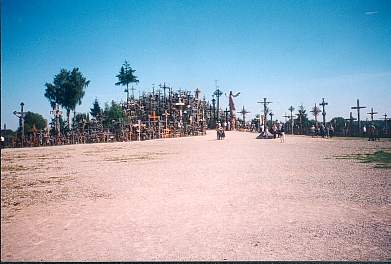 The Hill of Crosses near Siauliai
The Hill of Crosses near Siauliai
Still, the next day I was taken to the Hill of Crosses by the two Linkuva Policemen and felt very, very fragile all the way there and back. the Hill of Crosses, near Siauliai has to be seen to be believed. No photo does it justice. This is a prehistoric Hill Fort where countless generations of Lithuanians have placed crosses of all sizes. During Soviet times, the Russians bulldozed it several times, but it was always rebuilt and became a centre of Lithuanian passive resistence and a potent symbol of one people's stoic expression of nationhood in the face of foreign oppression.
TEACHERS DAY
Teacher's Day is an excellent tradition that allows teachers to let their hair down for the day and also allows the pupils the chance to have good fun at the teachers' expense. In some schools it is more of an event than in others and Linkuva was one of the more energetic. What happened was that the teachers arrived as usual one Friday early in October. But for this day only, the teachers become the pupils and the older pupils become the teachers. They have to teach the younger classes, whilst individuals teach the class of teachers. We started with Physical Education where we all had to run about like mad things, shooting B-ball, running races. We then took in geography, history, maths, had to apologise for our mistakes, be disciplined for our tresspasses. The highlight was the lesson known as WORK. This class is a mixture of different things and includes woodwork and metallwork but also gives school children community tasks like leaf clearing in autumn, in order to prepare children for their adult lives. In our Work Class, we were made to learn how to milk a goat. Antanas Ambromavicius, the popular Deputy Head, who sadly passed away in 1999, was chosen to be the first learner. Unfortunately he made the predictable mistake of bending down with his back to the goat in horns' reach. Needless to say the goat butted his backside full on sending him flying and causing wild hilarity! At the end of the day there was a Graduation prize-giving where each Teacher received a caricature of themselves with their catchphrase printed on it. Mine had me standing with my long scarf, and my Classroom Catchphrase, the unimaginative Yes, Good printed on it. After the bell went for the end of the day the teachers held a party where the vodka and Cepeliniai (the national dish of Lithuania, an uninspiring potato dish that the Lithuanians love) freely flowed
EWEN
My friend Ewen lived in Birzai when I was in Pasvalys. He is now married to Saule and they have a lovely daughter Rebeka. I go to visit them every year, at least once a year and was a Best Man at their Wedding, as is Lithuanian tradition. I hope to include many stories of Ewen and my escapades, including his Stag Night which involved a mayhemic trip to see Scotland majestically fight out a glorious Nil-nil draw with Lithuania at football in Vilnius
THE COW HOLE or Karves Ola!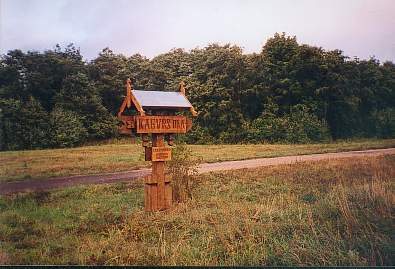
In 1997 my friend Neil and I went to visit Ewen in Birzai for two weeks. There were many adventures on that trip. One of the oddest was a trip to Birzai's legendary Cow Hole. About two miles out of Birzai is a sign that says Geological Wonder 2 Kilometres. It is the Cow Hole. Legend has it that a cow was standing in a field when the ground opened up and the cow disappeared! Birzai Region is well known for the holes that appear when the limestone erodes, and this one was allegedly spectacular. We walked in the rain for almost four miles, along mainly dirt roads. There was an impressively carved sign indicating that we were almost at the Cow Hole. We had visions of a perfectly round hole, deep into the ground of a field, with the bones of a cow lying at the bottom. We walked past a small fissure in the ground and knew we must be close now. Another few hundred yards and we realised that this small fissure was in fact, the Cow Hole itself! Ewen was almost thrown in! Another two miserable miles hiking back to Birzai and we were too tired to beat him!
Back in 1994 Lithuania was still emerging from 50 years of Russian domination and Soviet stagnation. It was only three years since independence and Lithuania was still finding its economic feet. When I compare Lithuania in 2003 to then, in some ways it is a very different country. In 1994, the cash register was virtually unknown. Every shop used an abacus to sum up your groceries, and we all became very adept at knowing how much we owed by the abacus, and ensuring we weren't being overcharged. Over the two years I was there, the cash register became more and more common, although with a quaint transitional period when staff would ring up your groceries on the abacus and then punch the total owed into the cash register instead of letting the machine do the work! Now the cash register is ubiquitous, even in the small roadside kiosks that sell only newspapers and cigarettes and the abacus nowhere to be seen.
Another thing there is nothing of anymore is the traditional Soviet shortage. In 1994 you were guaranteed that if you didn't really need a product, say, garlic or onions, it would be abundant in the shops. But the minute you ran out, there became a shortage of those products. No onions for a week! Also, in those days, you still had state-run shops, the shops previously run by the Soviet Government, and still owned by the state until the open market guaranteed access to products for all. These shops were an incredible experience of Soviet attitudes. The people who worked in them were guaranteed a job for life, or at least until the overthrow of Communism and as a result, the attitude was sometimes one of lackadaisical indifference. I recall a friend telling of a visit to a State-owned shop in Utena in the east of Lithuania. He asked for a kilo of onions and the person serving told him that the onions she was selling were of poor quality and that he should purchase his onions elsewhere! Honest, but unlikely to ensure survival in the brave new capitalist world. Nowadays, the supermarket, previously unknown outside of Vilnius, is king. 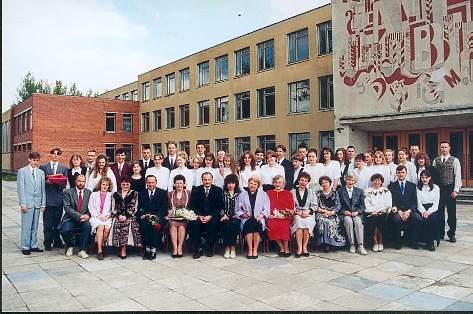 The graduation class of Linkuva 1997, 73rd Laida
The graduation class of Linkuva 1997, 73rd Laida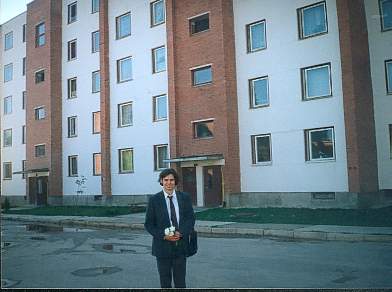 Me outside my flat in Pasvalys, 1995
Me outside my flat in Pasvalys, 1995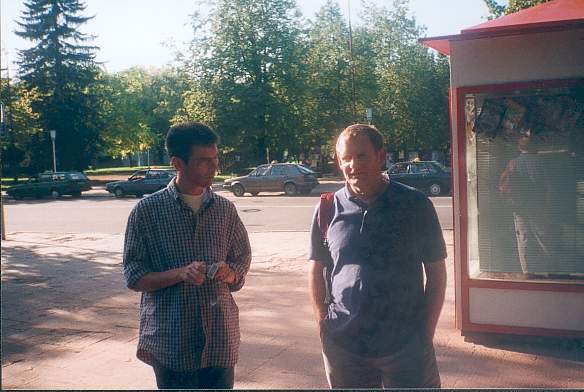 My Dad and Ewen in Siauliai, 1999
My Dad and Ewen in Siauliai, 1999
Back to contents
Click here for Page 2
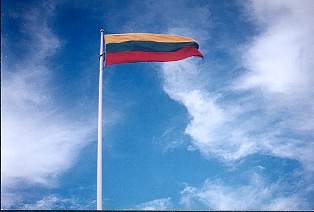 Sign Guestbook
View GuestbookArchived messages from Guestbook
Sign Guestbook
View GuestbookArchived messages from Guestbook
 At the outskirts of Linkuva, 1995. Click on photo for a link to a very interesting and moving site concerning the pre-war Jews of Linkuva
At the outskirts of Linkuva, 1995. Click on photo for a link to a very interesting and moving site concerning the pre-war Jews of Linkuva